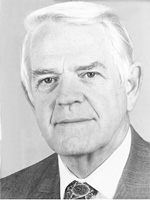
Howard Wakeland received his bachelor degree from the University of Illinois in 1950. After one year as a field engineer for the Illinois State Water Survey, he enrolled in graduate school and received an M.S. degree in 1954. He was also appointed as assistant dean in the College of Engineering and assistant professor of agricultural engineering that same year. Wakeland became associate dean in 1968, when he was also promoted to full professor. During thirty-nine years in the dean's office, he was responsible for certifying graduation of twenty-six thousand students. "Howie," as his associates came to know him, was responsible for the administrative details of the many undergraduate programs in the College of Engineering, many of them the direct result of his efforts.
The Minority Engineering Program was an outstanding example of Wakeland's success in establishing innovations in traditional engineering education. It began in 1968 when he met with a group of black engineering students to discuss the progress being made on campus on their behalf. He responded to their concerns, and by 1973 his efforts in minority engineering were sufficiently well-recognized for him to be invited to Washington, D.C. to be involved in the several national minority engineering education programs. For his pioneering efforts, Wakeland was recognized with the American Society for Engineering Education's Vincent Bendix Minorities in Engineering Award.
An eloquent speaker, Wakeland has become noted for statements remembered as "Wakelandisms:"
"Placing a student in a course that is too advanced is like offering him a drink of water from a fire hose," "The U. S. is not likely to reach its greatest technical potential unless the American engineering community is as capable as that of its global competitors," and "Competing successfully internationally requires cultural awareness, international experience, and language skills."
The philosophy in the last two statements led to Wakeland's greatest achievement in international engineering education-his leadership role in the creation and development of the Engineering Alliance for Global Education (EAGLE). This coalition of fifteen engineering schools sponsors students to work in Japanese industry following graduation and completion of intensive language studies. After his retirement, Wakeland served as the executive director of EAGLE, the secretariat of which is located on the Urbana-Champaign campus. Wakeland has also contributed to engineering exchange programs in many countries.
As a fitting tribute to Wakeland and his belief that engineers of the twenty-first century will be bilingual leaders in academe, industry, and government, he was awarded the Palmes Académniques by the French government for his efforts in expanding and developing exchange programs with French engineering schools.